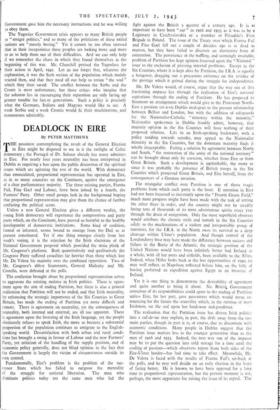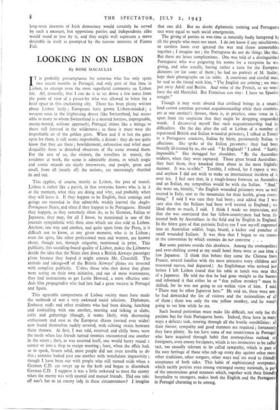DEADLOCK IN EIRE
By PETER MATTHEWS Unless a new General Election gives a different verdict, the young Irish democracy will experience the compromises and party pacts which, on the Continent, have proved so harmful to the healthy development of democratic institutions. Some kind of coalition, formal or informal, seems bound to emerge from the Dail as at present constituted. Yet if one thing emerges clearly from last week's voting, it is the rejection by the Irish electorate of the National Government proposal which provided the main plank of Mr. Cosgrave's platform. Both quantitatively and qualitatively the Cosgrove Party suffered casualties far heavier than those which lost Mr. De Valera his majority over the combined opposition. Two of Mr. Cosgrave's ablest lieutenants, General Mulcahy and Mr. Costello, were defeated at the polls.
The confusion brought about by proportional representation serves to aggravate the existing malaise in Irish politics. There is agree- ment upon the aim of ending Partition, but there is also a general realisation that Partition will not be ended, and that Irish neutrality, by enhancing the strategic importance of the Six Counties to Great Britain, has made the ending of Partition yet more difficult and remote. There is agreement on neutrality, yet the consequences of neutrality, both internal and external, are all too apparent. There is agreement upon the fostering of the Irish language, yet the people obstinately refuses to speak Irish, the more so because a substantial proportion of the population continues to emigrate to the English- speaking world. Dissatisfaction with both urban and rural condi- tions has brought a swing in favour of Labour and the new Farmers' Party, yet criticism of the handling of the supply position, and of economic policy generally, does not blind opinion to the fact that the Government is largely the victim of circumstances outside its own control.
Fundamentally, Eire's problem is the problem of the suc- cessor State which has failed to outgrow the mentality of the struggle for national liberation. The men who dominate politics today are the same men who led the
fight against the British a quarter of a century ago. It is as important to have been " out " in 1916 and 1933 as it was to be a Legionary in Czechoslovakia or a member of Pilsudski's First Brigade in Poland. The issue of the Treaty over which Fianna Fail and Fine Gael fell out a couple of decades ago is as dead as mutton, but they have failed to discover an alternative bone of contention. The persistence of the baffling, and seemingly insoluble, problem of Partition has kept opinion focussed upon the " National " issue to the exclusion of pressing internal problems. Except in the Six Counties, where it is kept alive by Partition, the I.R.A. is equally a hangover, dragging out a precarious existence on the residue of the prestige which it gained during the struggle for independence.
Mr. De Valera would, of course, argue that the way out of this frustrating impasse lies through the realisation of Eire's national aspirations through the ending of Partition. He has proposed to Stormont an arrangement which would give to the Protestant North-- East a position vis-a-vis Dublin analogous to the present relationship between Belfast and London, but with the addition of safeguards for the Nationalist-Catholic " minority within the minority." Nationalist spokesmen in Dublin frankly admit, however, that majority opinion in the Six Counties will have nothing of their proposed solution. Life in an Irish-speaking backwater, with a policy tending towards autarky, may appeal to the Nationalist minority in the Six Counties, but the dominant majority finds it wholly inacceptable. Failing a solution by agreement between North and South, " the restoration of the unity of the national territory " can be brought about only by coercion, whether from Eire or from Great Britain. Such a development is unthinkable, the more so since it was probably the presence of British troops in the Six Counties which preserved Great Britain, and Eire herself, from the consequences of a German invasion.
The triangular conflict over Partition is one of those tragic problems from which each party is the loser. If attention in Eire had not been focussed so insistently upon the " Fourth Green Field," much more progress might have been made with the task of setting the other three in order, and the country might not be steadily losing tens of thousands of its most adventurous spirits every year through the drain of emigration. Only the most superficial observer would attribute the chronic strife and tumult in the Six Counties solely to the machinations of a violent and irresponsible group of terrorists, for the I.R.A. in the North owes its survival to a deep cleavage within Ulster's population. And though control of the Londonderry base may have made the difference between success and failure in the Battie of the Atlantic, the strategic position of the United Nations would have been infinitely better had Ireland as • a whole, with all her ports and airfields, been available to the Allies. Indeed, when Hitler looks back at the lost opportunities of 1940, he may well reflect. as Napoleon reflected before him, on the folly of having preferred an expedition against Egypt to an invasion of Ireland.
Yet it is one thing to demonstrate the desirability of agreement and quite another to bring it about. No Britis14 Government conscious of its responsibilities could agree to the ending of Partition unless Eire, for her part, gave guarantees which would mean re- nouncing for the future the neutrality which, in the opinion of most Irishmen, set the seal upon her hard-won independence.
The realisation that the Partition issue has driven Irish politics into a cul-de-sac may explain, in part, the drift away from the two main parties, though in part it is, of course, due to discontent with economic conditions. Many people in Dublin suggest that the Partition issue matters less to the younger generation than to the men of 1916 and 1933. Indeed, the best way out of the impasse may be to put the question into cold storage for a time until the cooling of passions—which observers report from both sides of the Eire-Ulster border—has had time to take effect. Meanwhile, Mr. De Valera is faced with the results of Fianna Fail's set-back at the polls, and he may well decide on an early election in the hope of faring better. He is known to have been opposed for a long time to proportional. representation, but the present moment is not, perhaps, the most opportune for raising the issue of its repeal. The long-term interests of Irish democracy would certainly be served by such a measure, but opposition parties and independents alike would stand to lose by it, and they might well represent a move desirable in itself as prompted by the narrow interests of Fianna Fail.



























 Previous page
Previous page